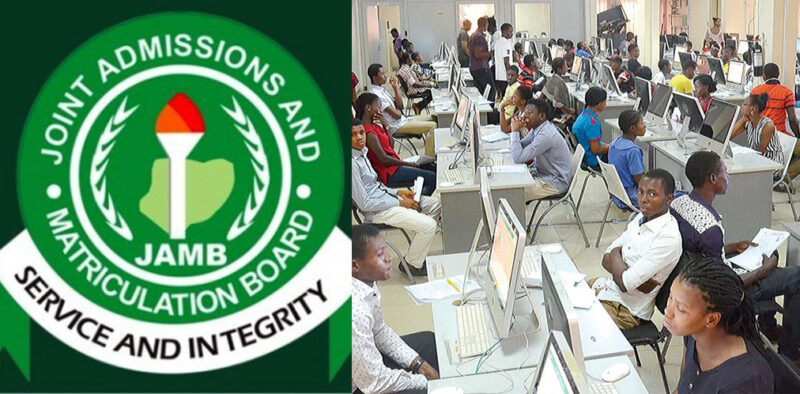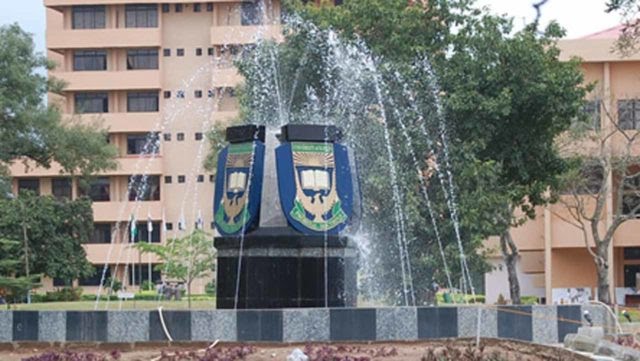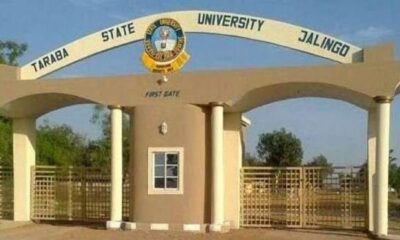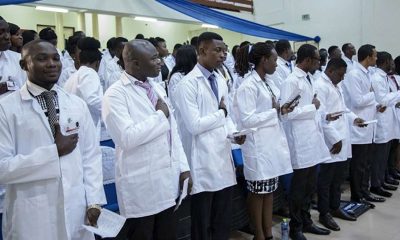Education
ASUU adamant on renegotiated agreement

The Academic Staff Union of Universities (ASUU) has insisted on the signing of the draft agreement reached with the Federal Government for university teachers.
Its president, Prof Emmanuel Osodeke, said the union was yet to receive official communication from the government regarding a new proposal on salary review.
Labour said it would go ahead with its planned pro-ASUU protest tomorrow, but electricity workers would not withdraw their services.
Activist-lawyer Femi Falana (SAN) backed Labour, saying the right to protest was fundamental.
He urged the police to provide security for those protesting.
The Nation had reported that the government was ready to increase the salaries of professors by 100 per cent, with each earning N1million monthly.
This is against the 180 per cent increase said to have been recommended by the Prof Nimi Briggs Committee that renegotiated the 2009 agreements with university unions.
The government has rejected the figures reached in the draft agreement with ASUU.
Osodeke said: “That (the 100 per cent pay rise proposal) is still a social media report; we are not aware.
“We have a negotiated agreement. If they have issues, they should come back to us, not go to the public.
“There is no offer, nothing from the government. When we see what they bring, we will look at it. That is collective bargaining.
Also yesterday, ASUU Chairman, University of Ibadan, Prof Ayo Akinwole, said signing and implementing the renegotiated 2009 agreement would end the over five months strike.
“Until we rise above sentiments to get responsible and responsive people who will be accountable to Nigerians into public offices the cycles of strikes will not end in Nigeria,” he said.
Akinwole called on Nigerians to join the struggle to revitalise public universities to give children of the masses hope.
He said unless that was done, the children of the ruling class trained overseas will return to take over from their “wicked parents” and continue to enslave Nigerians.
Akinwole added: “We got here by collective negligence of electing incompetent people into public offices.
“The fight for quality education for the children of the masses has become a class war among the economic elite, the working class and the ruling class.
“Until we rise and demand accountability from those in office to do what is in the best interest of the majority, the cycle of strikes and underdevelopment will not stop.
“Our renegotiation ought to have ended by 2012 but here we are in 2022 and yet the government is playing games with us.
“We are asking for a renegotiation of existing agreements that will position our members as human beings working in a decent place.
“We are asking for the revitalisation of public universities through appropriate funding; and a better homegrown alternative of University Transparency Accountability Solution (UTAS).
“We are saying check the proliferation of universities that you cannot fund and we are saying Nigerians deserve to be ranked among the top 100 in the world if our leaders invest in education.
“We should be developing our own solutions not depending on others.
“This strike is not about ASUU. It is about the future of the Nigerian children.”
‘Electricity workers won’t withdraw service’
The Nigeria Labour Congress (NLC) said it was pressing ahead with the nationwide rally in solidarity with the striking university unions.
Deputy President Joe Ajaero said state councils and affiliates of the NLC would hold their protest rally tomorrow while the national headquarters would hold it on Wednesday in Abuja.
Ajaero, who doubles as the General Secretary of the National Union of Electricity Employees (NUEE), however, said workers in the sector would not withdraw their services tomorrow.
He said: “States will hold their rally on Tuesday and that of the national is on Wednesday in Abuja.
“All the affiliates of the NLC have been mobilised and we are going ahead with the protest as planned.
“We won’t withdraw service because it is just a solidarity rally.”
Engineers to join protest
The National Union of Civil Engineering Construction, Furniture and Wood Workers (NUCECFWW), has directed members to fully participate in the Tuesday and Wednesday nationwide protest by NLC.
Its President Stephen Okoro and General Secretary Ibrahim Walama, said in a statement: “The protracted ASUU strike has been as a result of Federal Government carefree attitude towards ASUU, NASU, SSANU demand for the welfare of working people in tertiary institutions and particularly federal universities.
“The NUCECFWW joins other unions to unequivocally condemn the unwillingness of the Federal Government to find a solution for our children to go back to school without further delay because 14th July, 2022 was exactly five months of ASUU strike.
“As the strike lingers, students’ academic performance suffers…
“Unfortunately, with the strike characterising the Nigeria public University system, it is doubtful if the students can measure up to the task of keeping pace with the global trajectory…
“We wish to inform the Federal Government of Nigeria and the general public that we are putting all our members on red alert to be in solidarity action in line with NLC.
“We remain solidly behind ASUU’s demands and against Federal Government’s recalcitrant approach reneging on existing negotiated agreements.”
Protest legal, says Falana
Falana said that the planned protest by the NLC was legal.
According to him, Labour’s action is an expression of the freedom of expression and freedom of assembly guaranteed by sections 39 and 40 of the 1999 Constitution and articles 39 and 40 of the African Charter on Human and Peoples Rights.
“Having confirmed that the NLC has notified the Authorities of the Nigeria Police Force of the planned protest marches and rallies in strict compliance with the provision of the Police Establishment Act, 2020, we call on the Federal Government to respect the democratic wishes of Nigerian workers to identify with the striking university lecturers,” Falana said.
Education
Over 1.5 Million Candidates Registered as JAMB UTME Pin Vending Nears Deadline

Over 1.5 Million Candidates Registered as JAMB UTME Pin Vending Nears Deadline
The Joint Admissions and Matriculation Board (JAMB) has confirmed that more than 1.5 million candidates have registered for the 2026 Unified Tertiary Matriculation Examination (UTME), as the deadline for e‑PIN vending and registration rapidly approaches.
In a statement released in Abuja by the board’s Public Communication Advisor, Dr. Fabian Benjamin, the board said the sale of e‑PINs — required for candidates to proceed with registration at accredited centers — will close at midnight on Thursday, February 26, 2026, while actual registration at centres will end on Saturday, February 28, 2026.
According to JAMB, its daily registration capacity stands at 100,000 candidates, but most centres are currently operating at roughly 30 per cent capacity, indicating that a significant number of eligible candidates have yet to register. The board emphasised that there will be no extension of the registration window, explaining that the schedule aligns with the national examination calendar and is coordinated to allow other examination bodies to conduct their exercises without conflict.
READ ALSO:
- FG Seals Plateau Mine After 37 Killed in Toxic Gas Tragedy
- Troops Kill Five Kidnappers, Rescue Abducted Woman in Plateau
- Sowore Condemns Electoral Act 2026 as Threat to Nigeria’s Democracy
JAMB urged candidates to secure their e‑PINs early and complete registration at accredited CBT centres without delay. The board warned that last-minute registration could result in avoidable challenges and reiterated that it will not entertain appeals for deadline extensions.
The 2026 UTME is scheduled to hold from April 16 to April 25 and will determine admission into universities, polytechnics, and colleges of education across Nigeria. JAMB also assured candidates that all testing centres would have adequate security, technical support, and invigilation to ensure a smooth and credible examination process.
Education experts and stakeholders have encouraged candidates to register promptly and take advantage of preparatory resources offered online and at local centres. State education authorities have also organised orientation programmes to guide students through registration, examination, and post-UTME procedures.
JAMB continues to provide updates and guidance through its official portal and social media channels, ensuring that candidates have access to information about registration, examination procedures, and exam day requirements.
Over 1.5 Million Candidates Registered as JAMB UTME Pin Vending Nears Deadline
Education
BREAKING: Academic Activities Halted as ASUU Resumes Strike

BREAKING: Academic Activities Halted as ASUU Resumes Strike
The Academic Staff Union of Universities (ASUU), Taraba State University (TSU) branch, has resumed an indefinite strike, citing the failure of the Taraba State Government to honour agreements reached earlier with the union.
The industrial action comes weeks after ASUU suspended its earlier strike following negotiations held on January 17, 2025, a move the union said was done in good faith to allow the government time to meet its commitments. According to ASUU, those promises were not fulfilled, forcing lecturers to withdraw their services again.
In a statement issued in Jalingo, the ASUU TSU branch chairman, Joshua Garba Mbave, said the government failed to take practical and verifiable steps toward resolving the lingering issues affecting staff welfare.
READ ALSO:
- Ramadan Health Tips: Six Ways to Stay Hydrated While Fasting
- Tinubu Urges Senate to Confirm Yusuf for NAHCON, Marafa for INEC
- Galatasaray Stun Juventus 5–2 in UEFA Champions League
The union said its congress meeting held on February 18, 2026, reviewed developments since the suspension of the strike and unanimously agreed to resume the total, comprehensive, and indefinite strike.
ASUU listed several unresolved demands, including unpaid salary arrears, non-payment of Earned Academic Allowances, the absence of a functional pension scheme for university workers, and the failure to implement the 2025 ASUU–Federal Government agreement applicable to state-owned universities.
Dr. Mbave warned that the continued neglect of these issues has crippled staff morale, worsened economic hardship for lecturers, and disrupted academic stability at Taraba State University. He stressed that sustained dialogue with the Taraba State Government had produced no concrete outcome.
As a result of the renewed strike, academic activities at Taraba State University have been suspended indefinitely, with students advised to remain at home until further notice.
BREAKING: Academic Activities Halted as ASUU Resumes Strike
Education
Check Your Name: UNILORIN Releases Updated NELFUND Refund List for 2024/2025 Students

Check Your Name: UNILORIN Releases Updated NELFUND Refund List for 2024/2025 Students
The University of Ilorin (UNILORIN) has released a new list of students eligible to apply for the 2024/2025 NELFUND refund, according to the UNILORIN Students’ Union (SU). Students who paid school fees before NELFUND disbursed funds directly to the university are now required to check their names and submit refund requests through the proper channels.
The official refund eligibility list has been shared in an Excel spreadsheet format and contains verified student details, including full name, matriculation number, department, and eligibility status. Students can search the file using their name or matric number to confirm their eligibility.
Those whose names appear on the list are instructed to fill the official refund form and submit supporting documents, including fee receipts and bank account details, to the Student Affairs Unit (SAU) or their respective Dean’s Office. The refund disbursement is gradual and ongoing, depending on NELFUND fund release schedules.
READ ALSO:
- Argungu Festival 2026 Highlights Peace, Stability, Economic Growth — Tinubu
- US Military Boosts Support for Nigeria’s Fight Against Insurgency With Ammunition, Troop
- Afenifere Calls for Immediate Take-Off of State Police as Terror Threats Rise in Yorubaland
For students whose names are not on the current list, they are advised to check their NELFUND portal status at portal.nelf.gov.ng and ensure all records are correctly verified. UNILORIN and the Students’ Union have also clarified that this is not the final list, as additional batches of eligible students may be added as verification continues.
Students are urged to act promptly, as following the prescribed procedures will ensure timely refund of fees paid in advance.
How to Check Your Eligibility
Students can confirm their eligibility by viewing the official list published by the university. To streamline verification, a table of students in the Department of Accounting and select departments is presented below.
| S/N | Matric Number | Student Name | Programme | Level | Department |
|---|---|---|---|---|---|
| 1 | 20/66MA093 | Johnson Babatunde Ogunwunmiju | B.Sc. Accounting | 400 | Accounting |
| 2 | 21/66MA002 | Zainab Oreoluwa Abdulrahmon | B.Sc. Accounting | 400 | Accounting |
| 3 | 21/66MA021 | Shukurat Oluwapelumi Adetunji | B.Sc. Accounting | 400 | Accounting |
| 4 | 21/66MA038 | Josephine Oluwateniola Akoki | B.Sc. Accounting | 400 | Accounting |
| 5 | 21/66MA049 | Vivian Member Aun | B.Sc. Accounting | 400 | Accounting |
| 6 | 21/66MA054 | Yusuf Olamilekan Babatunde | B.Sc. Accounting | 400 | Accounting |
| 7 | 21/66MA065 | Precious John Elijah | B.Sc. Accounting | 400 | Accounting |
| 8 | 21/66MA083 | Mariam Omowunmi Issa | B.Sc. Accounting | 400 | Accounting |
| 9 | 21/66MA088 | Toyosi Kolade | B.Sc. Accounting | 400 | Accounting |
| 10 | 21/66MA091 | Ayanfe Olaoluwa Makanjuola | B.Sc. Accounting | 400 | Accounting |
Note: The above table shows a partial list for illustration. The full list includes hundreds of students across various faculties and levels.
UNILORIN NELFUND Refund List 2025/2026
Check Your Name: UNILORIN Releases Updated NELFUND Refund List for 2024/2025 Students
-

 News3 days ago
News3 days agoSaudi Arabia Confirms Sighting of Ramadan Crescent, Fasting Begins Wednesday
-

 metro3 days ago
metro3 days agoLagos Woman Shares Ordeal After Alleged Rape, Sparks Nationwide Outcry
-

 News3 days ago
News3 days agoRamadan Begins in Nigeria as Sultan Confirms Crescent Sighting
-

 International21 hours ago
International21 hours agoCanada Opens New Express Entry Draw for Nigerian Workers, Others
-

 metro3 days ago
metro3 days agoSeven Killed in Horrific Crash at Ota Toll Gate
-

 News2 days ago
News2 days agoKorope Drivers Shut Down Lekki–Epe Expressway Over Lagos Ban (Video)
-

 Health2 days ago
Health2 days agoRamadan Health Tips: Six Ways to Stay Hydrated While Fasting
-

 metro20 hours ago
metro20 hours agoOsun Awards 55.6km Iwo–Osogbo–Ibadan Road Project to Three Contractors













